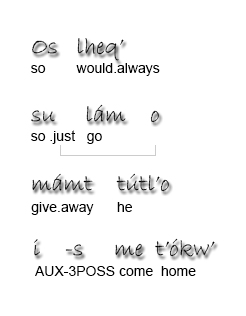Os lheq’ su lám o mámt tútl’o is me t’ókw’ means ‘So he would always just go and gave them away when he got home’.
Audio: Elizabeth Herrling
Structure and Vocabulary
The structure of this phrase is as follows:
- ósu is a general sentence connector, often untranslated but roughly meaning ‘so‘, or ‘and so‘.
- lhéq’ literally means ‘always’, but here carries the sense of ‘used to always’ or simply ‘used to’ (Elizabeth doesn’t do so here, but you can also add the past tense marker –elh, to make lhéq’elh – ‘used to‘, unambiguously past tense).
- Here, as is common, Elizabeth ‘splits’ the osu and inserts lhéq’ into the middle (possibly osu is really two words, though it is commonly written as one). See os lheq’ su.

- su…o – so just (from su – so combined with ew…o – just)
- lám – go
- mámt – ‘to give away’

- tútl’o – he, him
- i – an untranslatable ‘auxiliary’, related to the meaning ‘here‘. In this case it means something like ‘when‘.
- -s – marks that a third person subject is present (in this case, an understood ‘he‘ in ‘he comes home‘)
- me – come (an auxiliary ‘helper’ verb)
- t’ókw’ – to travel home




No comments yet.